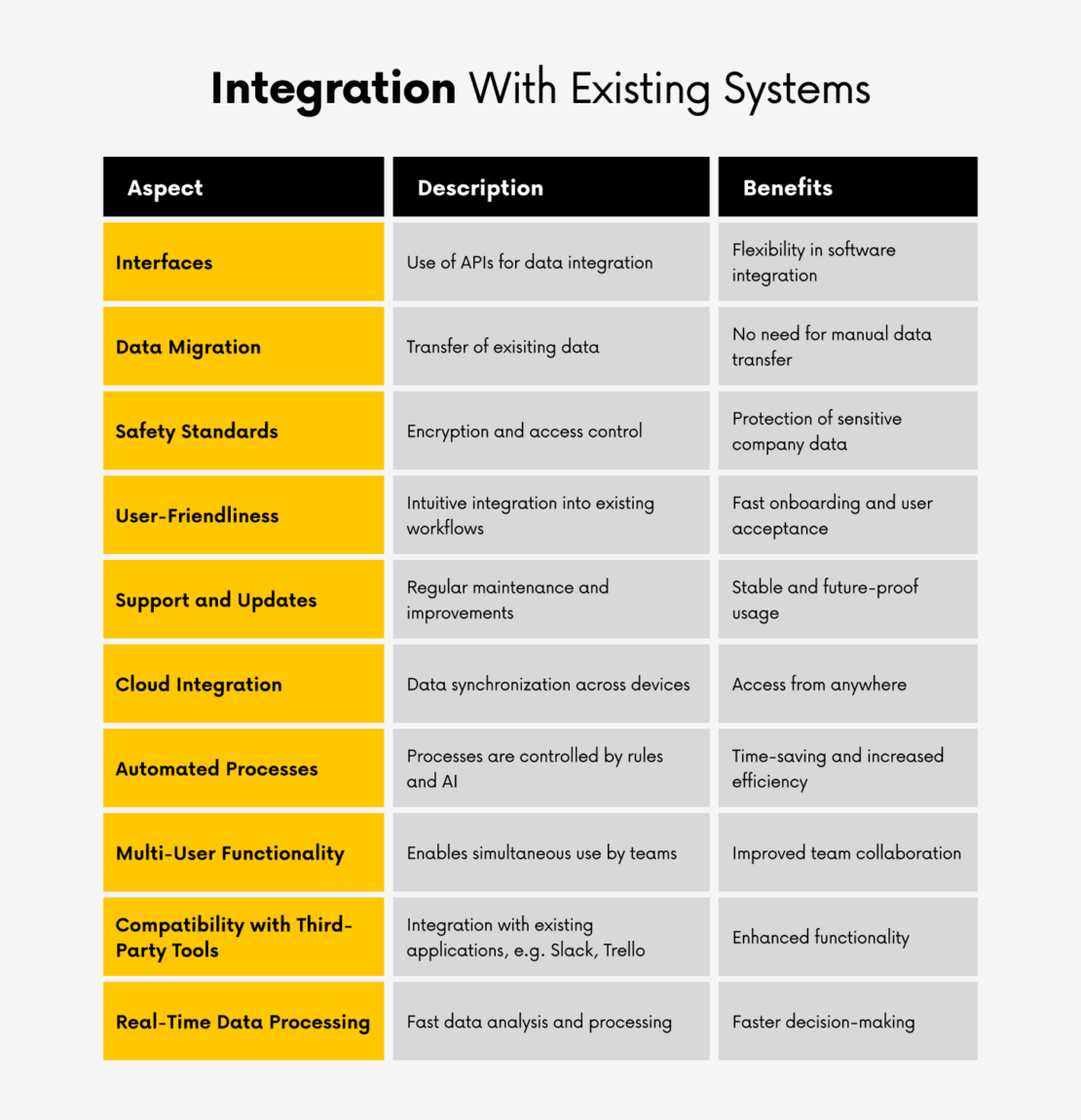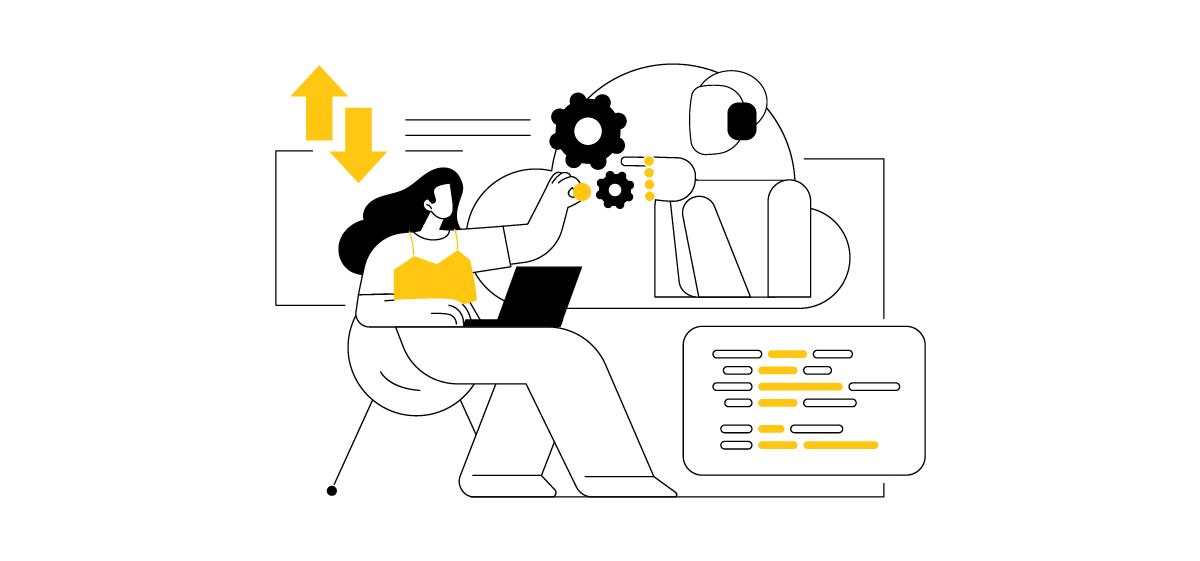
Management division is the heart of any company, as it is where all information converges and can be used to optimize processes. An AI-powered automated assistant can significantly enhance tasks such as scheduling, inventory management, and data analysis.
In this article, we’ll explore how AI assistants work and the advantages they offer, especially for small businesses. Through practical examples, you’ll learn how they can simplify day-to-day operations. We’ll also examine how they integrate with existing systems, what interfaces are required, examples of best practices, issues related to security and data protection, as well as future developments in this technology.
Table of Contents
What Exactly Is an AI Assistant?
Unlike earlier automation solutions, AI-based systems can use machine learning to make decisions. In other words, these systems learn from data to optimize the tasks it performs. This leads to a significant increase in efficiency and, as a result, time savings.
Another key difference compared to older systems is the broader range of users. Thanks to natural language processing (NLP), the system understands and processes human language, making it accessible even to those without technical expertise. With the help of proper interfaces, users can access critical company data needed to complete tasks. One particularly important feature is the AI’s contextual understanding, its ability to recognize relationships between pieces of information and draw appropriate conclusions. This allows the AI to not only analyze current and past events but also proactively suggest future actions or generate accurate forecasts.
Overall, artificial intelligence can assess and adjust ongoing processes in real time and generate forecasts almost instantly. This not only boosts a company’s competitiveness but also enhances security, as all relevant data is integrated and considered.
Benefits for Small Businesses – Time Savings and Increased Efficiency
AI-powered assistants bring advantages not only to small businesses but also to medium and large enterprises. However, the situation in small businesses is different, staffing levels are typically lower, and the range of responsibilities broader. This is precisely why automated assistants can have a much greater impact in small companies. They can significantly ease the workload by taking over repetitive tasks that are ideally suited for automation.
Benefits for Small and Medium-Sized Enterprises:
- Fewer manual data entries – leading to fewer errors and faster processes
- Real-time data analysis enables quicker decision-making
- Cost savings due to the reduced need for additional staff
- Improved customer service through faster response times
- Increased employee productivity by focusing on core tasks
- Business growth potential without significant additional investment thanks to scalability
Integration With Existing Systems – How Do It Smoothly?
Many companies face the challenge of digital transformation. One of the key issues is integrating new solutions with already existing systems. This primarily involves APIs, which allow for seamless data exchange between legacy systems and the automated assistant. Compatibility with ERP (Enterprise Resource Planning) systems, integration with CRM systems, email services, and other tools supporting daily business operations is essential.
In the table below, we’ve listed the most important aspects to consider during the integration process.

How To Effectively Implement an Assistant Into Daily Operations?
Experience shows that gradually introducing an AI assistant proves beneficial in the long run. It’s advisable to start with simple automation tasks and tailor the AI assistant to the specific needs of your company. A fundamental feature of AI-based assistants is their ability to continuously evolve, so their settings should be regularly reviewed and optimized.
It’s also highly recommended to train employees to ensure smooth operation and to fully leverage the assistant’s potential. In the background, automated analytics functions monitor performance and generate reports that serve as a foundation for further optimization measures.
Security and Data Protection in Automated Processes
One of the most significant topics in the IT industry is security and data protection. The goal is to minimize or eliminate potential threats in order to protect the company from losses while complying with GDPR—European data protection regulations. To effectively safeguard data, it’s essential to use end-to-end encryption, two-factor authentication, and access rights management that defines which employees have access to specific areas of the system.
Other crucial measures include regular security updates to eliminate potential vulnerabilities, anonymization of sensitive data, and creating backups to prevent data loss.
To defend against external attacks, it is also necessary to implement a firewall and antivirus protection. Moreover, strict rules should be established regarding the integration of third-party software—an often underestimated aspect that plays a vital role in the overall security of the system.
Case Studies – How Do Other Companies Use AI Assistants?
To better illustrate how an AI assistant can support everyday work, this section presents practical case studies—real-world implementations carried out in line with the described approach. As part of small business management software, the automated assistant demonstrates its real potential and business benefits.
Example 1
In the first example, the company took advantage of voice messaging capabilities, although a morning email from the assistant could also be used. Here’s how it works:
Every day, artificial intelligence checks the databases used in the company’s IT systems and sends a voice message to workshop owners 15 minutes before the start of the workday. These messages are typically played in the car or over a morning coffee—no reading required. The content of the messages changes daily. Here’s a sample message:
“Hi, we have 4 cars scheduled today. All employees are present, we can take on one more customer. MAN is overdue with an invoice dated 1.12.2024, and we have 10 liters of 5W30 oil and 20 H20 bulbs in stock. A 5W25 oil change is scheduled for tomorrow, which we do not have in stock. Have a nice day!”
Benefit: The workshop gains a daily time savings of 30 to 60 minutes on organizing the workday.
Example 2
Through the Teams app, the client can ask questions and retrieve data using natural language. Most systems have their own forms for generating summaries and reports. In our solution, the goal was to enable anyone—regardless of their knowledge of specialized tools—to independently create the reports they need.
Examples of questions:
- “Show me five customers who bought more in June than in May.”
- “How many transactions have we had with customers ordering over €50,000 per month?”
- “Which client has the highest ratio of monthly orders to monthly invoices?”
- “Who’s buying less this quarter compared to the last one?”
Benefits: The questions may seem simple, but first—you get answers very quickly, and second—you’re only limited by your imagination. Additionally, everyone has easy access to this kind of data, as the bot is always available within the Teams app (and it can work similarly in Google tools as well).
What Role Will AI Assistants Play in Developing Software for Small and Medium-Sized Enterprises?
The future of automation looks very promising. Advancements in voice control will allow AI assistants to better understand even complex queries, making automation even more precise. Processes will become more efficient and “intelligent,” and integration with IoT devices will work even more seamlessly. Furthermore, assistants will improve themselves through AI learning models, and the market will offer more tailored and advanced solutions for specific industries.
Overall, we can expect a broader range of services, and human-AI collaboration will become significantly more effective. As a result, AI solutions will gain greater acceptance even among small and medium-sized businesses and will become a standard in enterprise management.













